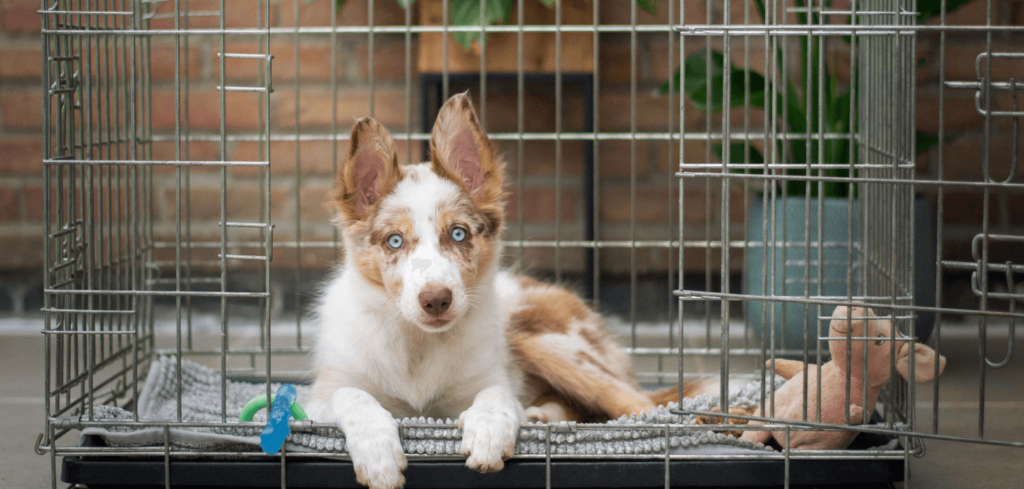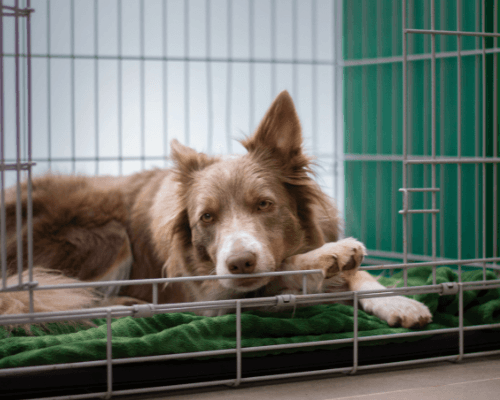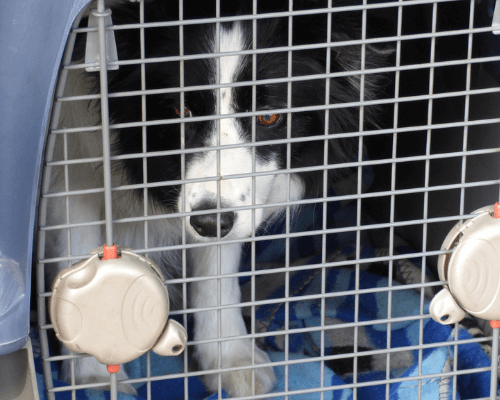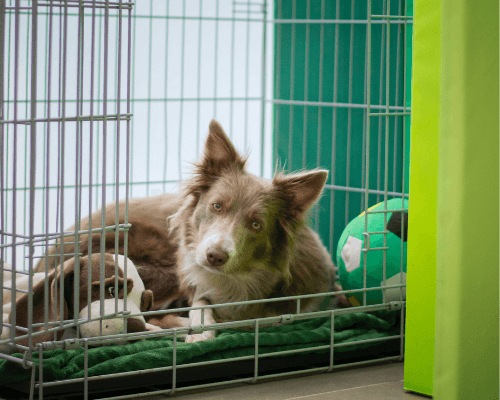
Puppies do all sorts of silly things, and oftentimes these things are harmless…
But if you notice your puppy biting his crate, you might be wondering if it’s a behavior you should continue to allow…
You might also wonder if it’s a sign that your pup might have a behavioral or medical issue that needs your attention…
Well, a lot of puppy parents have experienced their puppies biting their crates and wondered those same things…
So in this article, we’ll discuss various reasons why puppies do this, why it’s bad, and how you can get your puppy to stop doing it in the future…
Let’s dive in!
Your Puppy Is Biting His Crate – Reasons Why It’s Happening…
There are several reasons why puppies might bite their crates including teething, fear, boredom, or anxiety. Because this behavior will cause damage to your dog’s teeth and may lead to infections, you should determine why your puppy is biting his crate and take measures to prevent it.
There are 4 main reasons why puppies tend to bite their crates, and each one will require a different solution…
So let’s examine each reason in a little bit more detail…
1. Your Puppy Is Teething…
The first potential reason why your puppy is biting his (or her) crate is because he is teething.
Most puppies will start teething at around three weeks of age, and by the time they’re six months old, their adult teeth will start to come in.

During this stage of life, your puppy will chew on anything in his path to relieve some of the pain that accompanies the teething process.
Thankfully, it’s easy to know if teething is the cause behind crate-biting behavior because you can just look for more of the common signs of teething.
Some of these signs and symptoms include:
- Slow eating
- Red or swollen gums
- Frequent drooling
- Whining a lot
- Lost teeth
2. Your Puppy Fears The Crate…
Not all dogs are fond of their crates, especially if they have had negative past experiences or haven’t had time to be properly crate trained.
Your puppy might be biting his crate (and barking) because he fears being locked in and needs extra training to get used to being inside.
It’s also important to ensure that your puppy’s crate is the right size. If it’s too small it will be extremely uncomfortable for your little fur baby.
And even if it’s too big it can lead to problems such as your puppy using an area in the crate as a place to go potty.
3. Your Puppy Has Been In The Crate Too Long…
Sometimes, for whatever reason, we can lose track of the time, and it’s possible that your puppy has spent too much time in his crate.
Any dog who spends all day and all night in his crate can start to feel frustrated and trapped, and for puppies, you really shouldn’t keep them in a crate longer than 3 or 4 hours…
…because they aren’t really capable of controlling their bowels and bladders for much longer than that.

Aside from feeling frustrated, leaving your puppy in his crate too long might lead to boredom and even depression, which can lead to behavior like biting the crate…
On top of that, leaving your puppy in his crate too long can lead to destructive behavior and aggression when your puppy comes out as well.
4. Your Puppy Has Separation Anxiety…
Some puppies just aren’t comfortable inside crates, even for an hour or two, and this is usually the case if they suffer from separation anxiety.
This could be the reason why your puppy is biting his crate, and it can actually be him trying desperately to break out.
It’s a problem because your puppy could be damaging his teeth, but on top of that, he could hurt himself in the process of trying to get out.
So if you suspect that your puppy is biting his crate because of separation anxiety, you should contact a veterinarian immediately…
Worried About Your Dog’s Health? Click Here To Get Answers From A Verified Vet In Minutes (24/7)!
Will Biting The Crate Harm My Dog’s Teeth?
Yes. It might not be obvious in the beginning, but chewing crate bars over and over for a long period of time will have negative effects on your puppy’s teeth.
With constant scraping against solid bars, his teeth will slowly wear down.
Over time, his teeth, especially those making contact with the crate’s bars, will become damaged, and they may even need to be removed.
How To Know If Your Puppy’s Teeth Are Getting Damaged?
If your puppy only bites his crate every now and then, you probably don’t have much to worry about. But if he does it repeatedly, his teeth will probably be damaged.

For that reason, you should perform monthly oral checks to see if there’s something unusual going on with your puppy’s teeth. Here are a few signs of damage to be aware of:
- Loose teeth
- Chipped parts of teeth
- Saliva mixed with blood
- Yellow or brown accumulation on the surface of a tooth
- Black, brown, or red areas in the middle of a tooth
- Bad breath
If you notice any of these symptoms during oral checks of your puppy’s teeth, you should contact a vet for guidance…
Ignoring signs like these will not be beneficial for your dog and might lead to things like infections, which can be quite painful.
Worried About Your Dog’s Health? Click Here To Get Answers From A Verified Vet In Minutes (24/7)!
How Do I Get My Puppy To Stop Biting His Crate?
The key to stopping this behavior is to identify the reason behind it in the first place. Once you do, you can easily come up with a solution based on the situation.
For example, if your puppy is teething, your best bet is to give him an appropriate toy to chew on while he’s inside the crate.
This may be able to divert his attention from the crate bars and fulfill his need to ease some teeth or gum pain.
You can also try soaking a washcloth in water, freezing it, and then letting your puppy chew on it.
This will help numb your puppy’s mouth, which will give him some relief and allow him to chew on something that is soft.
If you tend to leave your puppy inside the crate for too long, start trying to fill some time will dog-friendly activities.
For example, make time to go on walks or go to the park with your puppy. Or if you’re simply too busy, you should check out this because will keep your dog entertained all day long in a science-based and healthy way.
If you suspect that separation anxiety is the reason why your puppy is biting his crate, then I recommend you discuss the issue with a vet to prevent behavioral problems and aggression from forming later on…

Last, it may just be the case that your dog is not properly crate trained, and if you need help in that area, I highly recommend you check out the Brain Training For Dogs program…
It’s a training program that teaches you how to easily redirect your dog’s natural intelligence to get him to become more obedient…
I like it because it’s very easy to follow, it works fast, and you can access the program from the comfort of your own home…
If you’d like to learn more about how Brain Training For Dogs can help you properly crate train your puppy, click the link below…

Wrap Up…
If your puppy is biting his crate there is an underlying issue causing it that you need to address. It might be something as simple as teething, but it could also be a sign of separation anxiety or lack of proper crate training…
Whatever the reason is, there is a way you can stop the behavior from happening, and you should because it can cause severe damage to your puppy’s teeth…
Just be sure to crate train your dog properly, and contact a vet if you have any concerns about the health and safety of your little fur baby.


